- Home
- Brandon Sanderson
The Way of Kings (Stormlight Archive, The) Page 15
The Way of Kings (Stormlight Archive, The) Read online
Page 15
Light and shadows flickered in the hallway, then a figure hesitantly looked into the alcove, a single white sphere cupped in one hand for light. It was not Jasnah. It was a man in his early twenties wearing simple grey robes. An ardent. Shallan relaxed.
The young man noticed her. His face was narrow, his blue eyes keen. His beard was trimmed short and square, his head shaved. When he spoke, his voice had a cultured tone. “Ah, excuse me, Brightness. I thought this was the alcove of Jasnah Kholin.”
“It is,” Shallan said.
“Oh. You’re waiting for her too?”
“Yes.”
“Would you mind terribly if I waited with you?” He had a faint Herdazian accent.
“Of course not, Ardent.” She nodded her head in respect, then gathered up her things in haste, preparing the seat for him.
“I can’t take your seat, Brightness! I’ll fetch another for myself.”
She raised a hand in protest, but he had already retreated. He returned a few moments later, carrying a chair from another alcove. He was tall and lean, and—she decided with slight discomfort—rather handsome. Her father had owned only three ardents, all elderly men. They had traveled his lands and visited the villages, ministering to the people, helping them reach Points in their Glories and Callings. She had their faces in her collection of portraits.
The ardent set down his chair. He hesitated before sitting, glancing at the table. “My, my,” he said in surprise.
For a moment, Shallan thought he was reading her letter, and she felt an irrational surge of panic. The ardent, however, was regarding the three drawings that lay at the head of the table, awaiting lacquer.
“You did these, Brightness?” he said.
“Yes, Ardent,” Shallan said, lowering her eyes.
“No need to be so formal!” the ardent said, leaning down and adjusting his spectacles as he studied her work. “Please, I am Brother Kabsal, or just Kabsal. Really, it’s fine. And you are?”
“Shallan Davar.”
“By Vedeledev’s golden keys, Brightness!” Brother Kabsal said, seating himself. “Did Jasnah Kholin teach you this skill with the pencil?”
“No, Ardent,” she said, still standing.
“Still so formal,” he said, smiling at her. “Tell me, am I so intimidating as that?”
“I have been brought up to show respect to ardents.”
“Well, I myself find that respect is like manure. Use it where needed, and growth will flourish. Spread it on too thick, and things just start to smell.” His eyes twinkled.
Had an ardent—a servant of the Almighty—just spoken of manure? “An ardent is a representative of the Almighty himself,” she said. “To show you lack of respect would be to show it to the Almighty.”
“I see. And this is how you’d respond if the Almighty himself appeared to you here? All of this formality and bowing?”
She hesitated. “Well, no.”
“Ah, and how would you react?”
“I suspect with screams of pain,” she said, letting her thought slip out too easily. “As it is written that the Almighty’s glory is such that any who look upon him would immediately be burned to ash.”
The ardent laughed at that. “Wisely spoken indeed. Please, do sit, though.”
She did so, hesitant.
“You still appear conflicted,” he said, holding up her portrait of Jasnah. “What must I do to put you at ease? Shall I step up onto this desk here and do a jig?”
She blinked in surprise.
“No objection?” Brother Kabsal said. “Well, then…” He set down the portrait and began to climb up on his chair.
“No, please!” Shallan said, holding out her freehand.
“Are you certain?” he glanced at the desk appraisingly.
“Yes,” Shallan said, imagining the ardent teetering and making a misstep, then falling off the balcony and plunging dozens of feet to the ground below. “Please, I promise not to respect you any longer!”
He chuckled, hopping down and seating himself. He leaned closer to her, as if conspiratorially. “The table jig threat almost always works. I’ve only ever had to go through with it once, due to a lost bet against Brother Lhanin. The master ardent of our monastery nearly keeled over in shock.”
Shallan found herself smiling. “You’re an ardent; you’re forbidden to have possessions. What did you bet?”
“Two deep breaths of a winter rose’s fragrance,” said Brother Kabsal, “and the sunlight’s warmth on your skin.” He smiled. “We can be rather creative at times. Years spent marinating in a monastery can do that to a man. Now, you were about to explain to me where you learned such skill with a pencil.”
“Practice,” Shallan said. “I should suspect that is how everyone learns, eventually.”
“Wise words again. I am beginning to wonder which of us it the ardent. But surely you had a master to teach you.”
“Dandos the Oilsworn.”
“Ah, a true master of pencils if there ever was one. Now, not that I doubt your word, Brightness, but I’m rather intrigued how Dandos Heraldin could have trained you in arts, as—last I checked—he’s suffering a rather terminal and perpetual ailment. Namely, that of being dead. For three hundred years.”
Shallan blushed. “My father had a book of his instruction.”
“You learned this,” Kabsal said, lifting up her drawing of Jasnah, “from a book.”
“Er…yes?”
He looked back at the picture. “I need to read more.”
Shallan found herself laughing at the ardent’s expression, and she took a Memory of him sitting there, admiration and perplexity blending on his face as he studied the picture, rubbing his bearded chin with one finger.
He smiled pleasantly, setting down the picture. “You have lacquer?”
“I do,” she said, getting it out of her satchel. It was contained in a bulb sprayer of the type often used for perfume.
He accepted the small jar and twisted the clasp on the front, then gave the bottle a shake and tested the lacquer on the back of his hand. He nodded in satisfaction and reached for the drawing. “A piece such as this should not be allowed to risk smudging.”
“I can lacquer it,” Shallan said. “No need to trouble yourself.”
“It is no trouble; it’s an honor. Besides, I am an ardent. We don’t know what to do with ourselves when we aren’t busying about, doing things others could do for themselves. It is best just to humor me.” He began to apply the lacquer, dusting the page with careful puffs.
She had trouble keeping herself from reaching to snatch the sketch away. Fortunately, his hands were careful, and the lacquer went on evenly. He’d obviously done this before.
“You are from Jah Keved, I presume?” he asked.
“From the hair?” she asked, raising a hand to her red locks. “Or from the accent?”
“From the way you treat ardents. The Veden Church is by far the most traditional. I have visited your lovely country on two occasions; while your food sits well in my stomach, the amount of bowing and scraping you show ardents made me uncomfortable.”
“Perhaps you should have danced on a few tables.”
“I considered it,” he said, “but my brother and sister ardents from your country would likely have dropped dead of embarrassment. I would hate to have that on my conscience. The Almighty is not kind toward those who kill his priests.”
“I should think that killing in general would be frowned upon,” she responded, still watching him apply the lacquer. It felt odd to let someone else work on her art.
“What does Brightness Jasnah think of your skill?” he asked as he worked.
“I don’t think she cares,” Shallan said, grimacing and remembering her conversation with the woman. “She doesn’t seem terribly appreciative of the visual arts.”
“So I have heard. It’s one of her few faults, unfortunately.”
“Another being that little matter of her heresy?”
“Indeed
,” Kabsal said, smiling. “I must admit, I stepped in here expecting indifference, not deference. How did you come to be part of her entourage?”
Shallan started, realizing for the first time that Brother Kabsal must have assumed her to be one of the Brightlady Kholin’s attendants. Perhaps a ward.
“Bother,” she said to herself.
“Hum?”
“It appears I’ve inadvertently misled you, Brother Kabsal. I’m not associated with Brightness Jasnah. Not yet, anyway. I’ve been trying to get her to take me on as a ward.”
“Ah,” he said, finishing his lacquering.
“I’m sorry.”
“For what? You did nothing wrong.” He blew on the picture, then turned it for her to see. It was perfectly lacquered, without any smears. “If you would do me a favor, child?” he said, setting the page aside.
“Anything.”
He raised an eyebrow at that.
“Anything reasonable,” she corrected.
“By whose reason?”
“Mine, I guess.”
“Pity,” he said, standing. “Then I will limit myself. If you would kindly let Brightness Jasnah know that I called upon her?”
“She knows you?” What business had a Herdazian ardent with Jasnah, a confirmed atheist?
“Oh, I wouldn’t say that,” he replied. “I’d hope she’s heard my name, though, since I’ve requested an audience with her several times.”
Shallan nodded, rising. “You want to try to convert her, I presume?”
“She presents a unique challenge. I don’t think I could live with myself if I didn’t at least try to persuade her.”
“And we wouldn’t want you to be unable to live with yourself,” Shallan noted, “as the alternative harks back to your nasty habit of almost killing ardents.”
“Exactly. Anyway, I think a personal message from you might help where written requests have been ignored.”
“I…doubt that.”
“Well, if she refuses, it only means that I’ll be back.” He smiled. “That would mean—hopefully—that we shall meet each other again. So I look forward to it.”
“I as well. And I’m sorry again about the misunderstanding.”
“Brightness! Please. Don’t take responsibility for my assumptions.”
She smiled. “I should hesitate to take responsibility for you in any manner or regard, Brother Kabsal. But I still feel bad.”
“It will pass,” he noted, blue eyes twinkling. “But I’ll do my best to make you feel well again. Is there anything you’re fond of? Other than respecting ardents and drawing amazing pictures, that is?”
“Jam.”
He cocked his head.
“I like it,” she said, shrugging. “You asked what I was fond of. Jam.”
“So it shall be.” He withdrew into the dark corridor, fishing in his robe pocket for his sphere to give him light. In moments, he was gone.
Why didn’t he wait for Jasnah to return himself? Shallan shook her head, then lacquered her other two pictures. She had just finished letting them dry—packing them in her satchel—when she heard footsteps in the hallway again and recognized Jasnah’s voice speaking.
Shallan hurriedly gathered her things, leaving the letter on the desk, then stepped up to the side of the alcove to wait. Jasnah Kholin entered a moment later, accompanied by a small group of servants.
She did not look pleased.
“Victory! We stand atop the mount! We scatter them before us! Their homes become our dens, their lands are now our farms! And they shall burn, as we once did, in a place that is hollow and forlorn.”
—Collected on Ishashan, 1172, 18 seconds pre-death. Subject was a lighteyed spinster of the eighth dahn.
Shallan’s fears were confirmed as Jasnah looked straight at her, then lowered her safehand to her side in a mark of frustration. “So you are here.”
Shallan cringed. “The servants told you, then?”
“You didn’t think that they would leave someone in my alcove and not warn me?” Behind Jasnah, a small group of parshmen hesitated in the hallway, each carrying an armload of books.
“Brightness Kholin,” Shallan said. “I just—”
“I have wasted enough time on you already,” Jasnah said, eyes furious. “You will withdraw, Miss Davar. And I will not see you again during my time here. Am I understood?”
Shallan’s hopes crumbled. She shrank back. There was a gravity to Jasnah Kholin. One did not disobey her. One need only look into those eyes to understand.
“I’m sorry to have bothered you,” Shallan whispered, clutching her satchel and leaving with as much dignity as she could manage. She barely kept the tears of embarrassment and disappointment from her eyes as she hastened down the hallway, feeling like a complete fool.
She reached the porter’s shaft, though they had already returned below after bringing up Jasnah. Shallan didn’t pull the bell to summon them. Instead she placed her back to the wall and sank down to the floor, knees up against her chest, satchel in her lap. She wrapped her arms around her legs, freehand clasping her safehand through the fabric of her cuff, breathing quietly.
Angry people unsettled her. She couldn’t help but think of her father in one of his tirades, couldn’t help but hear screams, bellows, and whimpers. Was she weak because confrontation unsettled her so? She felt that she was.
Foolish, idiot girl, she thought, a few painspren crawling out of the wall near her head. What made you think you could do this? You’ve only set foot off your family grounds a half-dozen times during your life. Idiot, idiot, idiot!
She had persuaded her brothers to trust her, to put hope in her ridiculous plan. And now what had she done? Wasted six months during which their enemies circled closer.
“Brightness Davar?” asked a hesitant voice.
Shallan looked up, realizing she’d been so wrapped in her misery that she hadn’t seen the servant approach. He was a younger man, wearing an all black uniform, no emblem on the breast. Not a master-servant, but perhaps one in training.
“Brightness Kholin would like to speak with you.” The young man gestured back down the hallway.
To berate me further? Shallan thought with a grimace. But a highlady like Jasnah got what she wanted. Shallan forced herself to stop shaking, then stood. At least she’d been able to keep the tears away; she hadn’t ruined her makeup. She followed the servant back to the lit alcove, satchel clutched before her like a shield on the battlefield.
Jasnah Kholin sat in the chair Shallan had been using, stacks of books on the table. Jasnah was rubbing her forehead with her freehand. The Soulcaster rested against the back of her skin, the smokestone dark and cracked. Though Jasnah looked fatigued, she sat with perfect posture, her fine silk dress covering her feet, her safehand held across her lap.
Jasnah focused on Shallan, lowering her freehand. “I should not have treated you with such anger, Miss Davar,” she said in a tired voice. “You were simply showing persistence, a trait I normally encourage. Storms alight, I’ve oft been guilty of stubbornness myself. Sometimes we find it hardest to accept in others that which we cling to in ourselves. My only excuse can be that I have put myself under an unusual amount of strain lately.”
Shallan nodded in gratitude, though she felt terribly awkward.
Jasnah turned to look out of the balcony into the dark space of the Veil. “I know what people say of me. I should hope that I am not as harsh as some say, though a woman could have far worse than a reputation for sternness. It can serve one well.”
Shallan had to forcibly keep herself from fidgeting. Should she withdraw?
Jasnah shook her head to herself, though Shallan could not guess what thoughts had caused the unconscious gesture. Finally, she turned back to Shallan and waved toward the large, gobletlike bowl on the desk. It held a dozen of Shallan’s spheres.
Shallan raised her freehand to her lips in shock. She’d completely forgotten the money. She bowed to Jasnah in thanks, then hurriedly collec
ted the spheres. “Brightness, lest I forget, I should mention that an ardent—Brother Kabsal—came to see you while I waited here. He wished me to pass on his desire to speak with you.”
“Not surprising,” Jasnah said. “You seem surprised about the spheres, Miss Davar. I assumed that you were waiting outside to recover them. Is that not why you were so close?”
“No, Brightness. I was just settling my nerves.”
“Ah.”
Shallan bit her lip. The princess appeared to have gotten past her initial tirade. Perhaps…“Brightness,” Shallan said, cringing at her brashness, “what did you think of my letter?”
“Letter?”
“I…” Shallan glanced at the desk. “Beneath that stack of books, Brightness.”
A servant quickly moved aside the stack of books; the parshman must have set it on the paper without noticing. Jasnah picked up the letter, raising an eyebrow, and Shallan hurriedly undid her satchel and placed the spheres in her money pouch. Then she cursed herself for being so quick, as now she had nothing to do but stand and wait for Jasnah to finish reading.
“This is true?” Jasnah looking up from the paper. “You are self-trained?”
“Yes, Brightness.”
“That is remarkable.”
“Thank you, Brightness.”
“And this letter was a clever maneuver. You correctly assumed that I would respond to a written plea. This shows me your skill with words, and the rhetoric of the letter gives proof that you can think logically and make a good argument.”
“Thank you, Brightness,” Shallan said, feeling another surge of hope, mixed with fatigue. Her emotions had been jerked back and forth like a rope being used for a tugging contest.
“You should have left the note for me, and withdrawn before I returned.”
“But then the note would have been lost beneath that stack of books.”
Jasnah raised an eyebrow at her, as if to show that she did not appreciate being corrected. “Very well. The context of a person’s life is important. Your circumstances do not excuse your lack of education in history and philosophy, but leniency is in order. I will allow you to petition me again at a later date, a privilege I have never given any aspiring ward. Once you have a sufficient groundwork in those two subjects, come to me again. If you have improved suitably, I will accept you.”

 Steelheart
Steelheart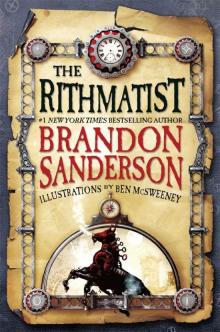 The Rithmatist
The Rithmatist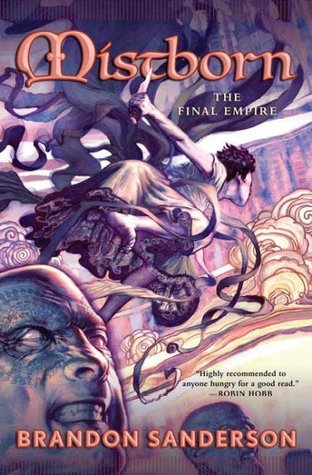 Mistborn: The Final Empire
Mistborn: The Final Empire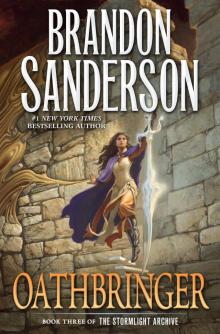 Oathbringer
Oathbringer The Way of Kings
The Way of Kings Redemption
Redemption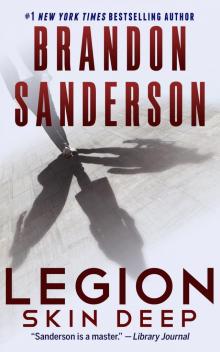 Skin Deep
Skin Deep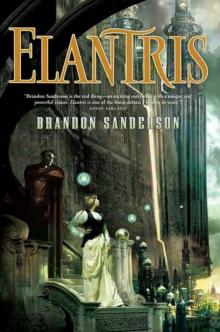 Elantris
Elantris Snapshot
Snapshot Sixth of the Dusk (Cosmere)
Sixth of the Dusk (Cosmere)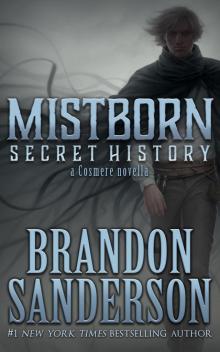 Mistborn: Secret History
Mistborn: Secret History White Sand, Volume 1
White Sand, Volume 1 Legion
Legion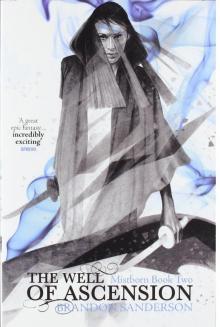 The Well of Ascension
The Well of Ascension The Bands of Mourning
The Bands of Mourning Words of Radiance
Words of Radiance The Hero of Ages
The Hero of Ages Calamity
Calamity Alcatraz Versus the Scrivener's Bones
Alcatraz Versus the Scrivener's Bones The Alloy of Law
The Alloy of Law The Emperors Soul
The Emperors Soul The Dark Talent
The Dark Talent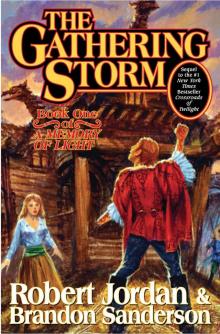 The Gathering Storm
The Gathering Storm Alcatraz Versus the Shattered Lens
Alcatraz Versus the Shattered Lens Mitosis
Mitosis Alcatraz vs. The Evil Librarians
Alcatraz vs. The Evil Librarians Rhythm of War (9781429952040)
Rhythm of War (9781429952040)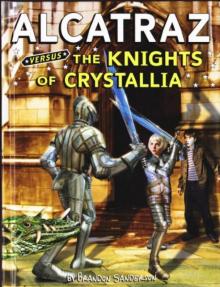 Alcatraz Versus the Knights of Crystallia
Alcatraz Versus the Knights of Crystallia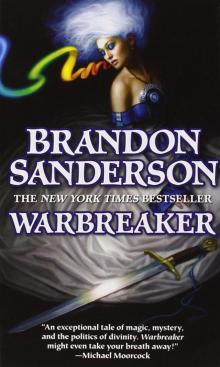 Warbreaker
Warbreaker Firstborn
Firstborn Starsight
Starsight Edgedancer
Edgedancer Perfect State
Perfect State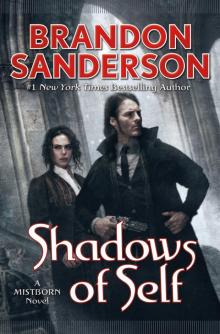 Shadows of Self
Shadows of Self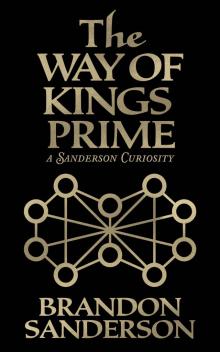 The Way of Kings Prime
The Way of Kings Prime Starsight (US)
Starsight (US) Shadows for Silence in the Forests of Hell
Shadows for Silence in the Forests of Hell Arcanum Unbounded: The Cosmere Collection
Arcanum Unbounded: The Cosmere Collection Awakening
Awakening Firefight
Firefight Dawnshard
Dawnshard Defending Elysium
Defending Elysium White Sand
White Sand Infinity Blade: Redemption
Infinity Blade: Redemption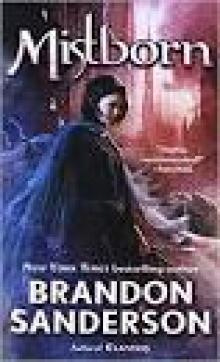 The Final Empire
The Final Empire Skyward
Skyward Lies of the Beholder
Lies of the Beholder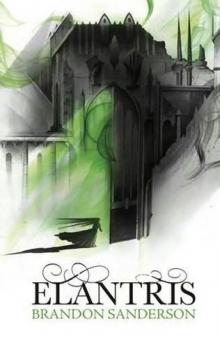 Elantris e-1
Elantris e-1 Steelheart r-1
Steelheart r-1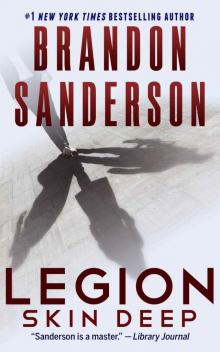 Legion: Skin Deep
Legion: Skin Deep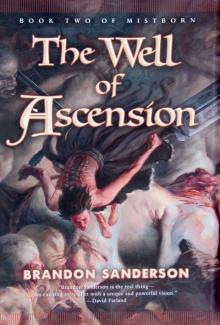 Well of Ascension
Well of Ascension Mistborn
Mistborn Alcatraz versus the Evil Librarians
Alcatraz versus the Evil Librarians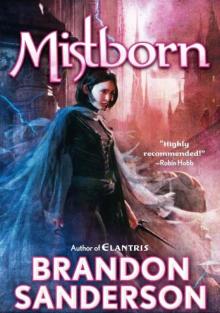 The Final Empire m-1
The Final Empire m-1 The Way of Kings (Stormlight Archive, The)
The Way of Kings (Stormlight Archive, The) Calamity (The Reckoners)
Calamity (The Reckoners)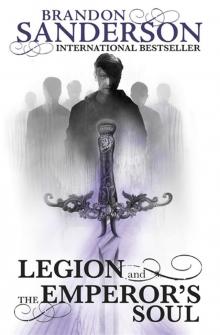 Legion and the Emperor's Soul
Legion and the Emperor's Soul Legion: The Many Lives of Stephen Leeds
Legion: The Many Lives of Stephen Leeds The Mistborn Trilogy
The Mistborn Trilogy Bands of Mourning
Bands of Mourning Alcatraz
Alcatraz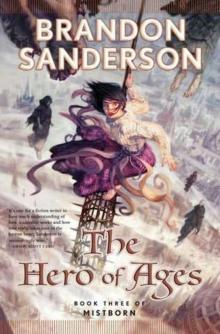 The Hero of Ages m-3
The Hero of Ages m-3 Alcatraz vs. the Shattered Lens
Alcatraz vs. the Shattered Lens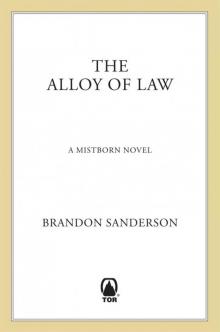 The Alloy of Law: A Mistborn Novel
The Alloy of Law: A Mistborn Novel The Way of Kings sa-1
The Way of Kings sa-1 Infinity Blade: Awakening
Infinity Blade: Awakening Sixth of the Dusk
Sixth of the Dusk The Stormlight Archive
The Stormlight Archive The Aether of Night
The Aether of Night